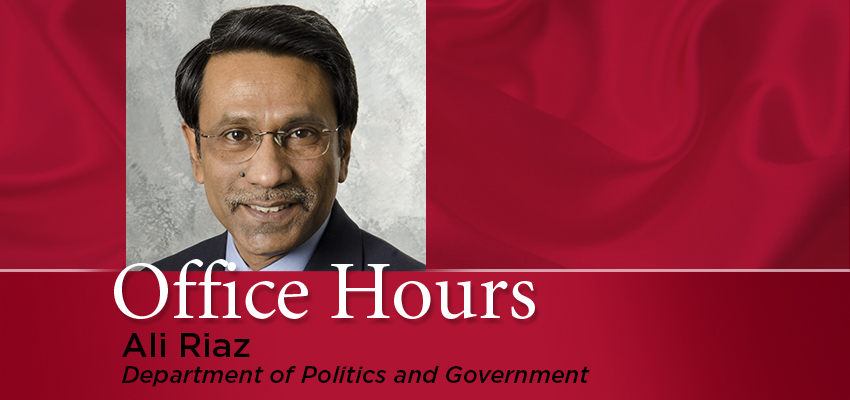The recent election in Bangladesh has been marred by record violence, with at least 18 people estimated dead.
Ali Riaz, chair of Illinois State University’s Department of Politics and Government, recently testified before Congress to warn of the impending danger surrounding the elections during his recent work at the Woodrow Wilson Center. Riaz also discussed unrest in Bangladesh during a recent interview on CNN.
In this edition of Office Hours, STATEside’s regular Q&A series with expert faculty members about current events, Riaz explains the political battle engulfing the country, and his hope for Bangladesh, where he was raised.
Who are the major parties involved?
The parties are the Awami League—led by Sheikh Hasina, the eldest daughter of the founding president of the country and the leader of the Awami League—and the Bangladesh National Party (BNP)—led by Khaleda Zia, the widow of the founder of the BNP.
 These two parties are very similar in terms of economic and social policies. Currently, where they differ is in the process of election. Since Bangladesh became a democracy in 1991, elections had been overseen by a caretaker government, or nonpartisan technocrats who did not participate in governing. In 2008, the Awami League came into power through a widely participated election and did away with that part of the constitution through an amendment in 2011. Under the new proviso, the election is held under the incumbent government. The BNP wanted the caretaker government restored to the constitution, and boycotted the recent election.
These two parties are very similar in terms of economic and social policies. Currently, where they differ is in the process of election. Since Bangladesh became a democracy in 1991, elections had been overseen by a caretaker government, or nonpartisan technocrats who did not participate in governing. In 2008, the Awami League came into power through a widely participated election and did away with that part of the constitution through an amendment in 2011. Under the new proviso, the election is held under the incumbent government. The BNP wanted the caretaker government restored to the constitution, and boycotted the recent election.
Is the change in the constitution the major difference between the parties?
Another major difference is about the International Criminal Tribunal, or ICT. The independence of Bangladesh from Pakistan in 1971 was very violent. More than 3 million people were killed by Pakistani military over nine months in what is—rightly—considered the genocide of the Bangladeshi.
Since 1973, the people have been calling for Bangladeshi who collaborated with the Pakistani Army and perpetrated genocide to be brought to trial. The Awami League gained control in 2008 on the promise of seeing the ICT come to fruition. While no one disputes the need for the ICT, many of those accused collaborators are Islamists, particularly to the Jamaat-i-Islami party, who are allied with the BNP. Party leaders are accusing the Awani League of using the ICT trial process to put down political rivals. Although the BNP stated that it is not opposed to the trial, it has demanded that those who are convicted be released, and the party hasn’t made clear as to how the trial should be conducted.
The two parties have been in power back and forth for decades. Why has it escalated to violence now?
There has been a growing polarization of the Bangladeshi society. There is no room for moderation, no room for grey in the black and white. Those who push for compromise are dismissed. The issues of caretaker government and the ICT have made the polarization more striking. The election held on January 5, 2014, has become a farce because half the seats of the parliament were elected unopposed, even before the election was held. And no more than 20 percent of people had voted on the Election Day. Corruption is an endemic. Political corruption is on all sides, and there is an absence of rule of law. Laws are not enforced properly. One of the major perpetrators of violence is the Islamist party—the Jamaat-i-Islami. With their leaders being convicted by the ICT, the party activists have been engaged in wanton violence and destruction of public properties.
Bangladesh is at a crossroads. Both the government and the opposition political parties need to find ways to move forward without violence, and understand that political differences cannot be resolved by force alone.
Can Bangladesh move on in the face of political turmoil?
Bangladesh is often considered a development paradox. It has 160 million people living within 56,000 square miles. It is sitting in a delta that floods and faces natural disasters, yet the people not only persevere, they have achieved enormous strides economically and socially in the past three decades. The Bangladesh economy has grown at the rate of 5 percent or above for past three decades even in the face of global downturns. It has made enormous achievements in female education. Their level of poverty is declining, and their sanitation efforts eclipse nearby India.
These are a people who have done what no one believed they could. So I have faith the Bangladeshi people will chose the right course. But Bangladesh may lose the opportunities it has gained if it is bogged down in unstable and acrimonious politics. I have confidence in Bangladeshi people, but I am afraid that failure in leadership could take the nation in the completely wrong direction.
Rachel Hatch can be reached at rkhatch@IllinoisState.edu.

